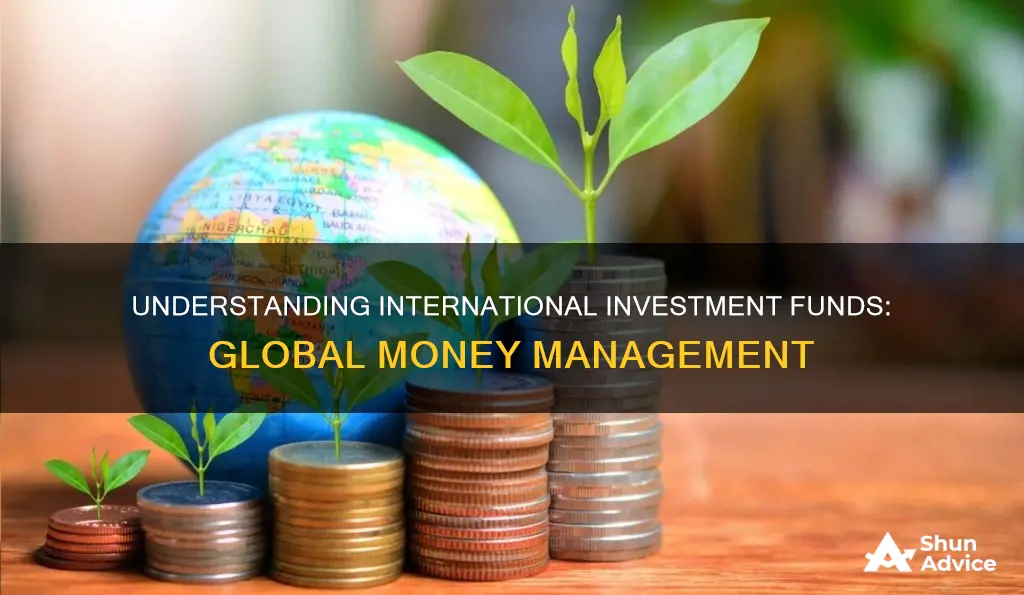
International funds are a type of mutual fund that can invest in companies outside of the investor's country of residence. They are a way to diversify a portfolio and balance risk, providing exposure to hundreds or even thousands of foreign securities. International funds can be a great way to avoid missing out on global opportunities, but they also come with the risk of currency volatility and changing economic or political landscapes, especially in emerging markets.
What You'll Learn

International funds vs global funds
International funds and global funds are two types of mutual funds that provide investors with different opportunities for investing in companies outside of their home country.
International Funds
International funds consist of securities from all countries except the investor's home country. These funds provide diversification for investors who already have a portfolio consisting mainly of domestic investments. International funds can also be used by speculators who anticipate a rise in a particular foreign market. These funds can invest in solid markets of developed countries, or in emerging markets, which are less mature and carry more risk.
Global Funds
Global funds consist of securities from all parts of the world, including the investor's home country. These funds are chosen by investors who wish to diversify against country-specific risk without excluding their own country. Global funds are also chosen by investors who may already have a lower-than-desired concentration of domestic investments or who do not want to take on the high level of sovereign risk involved in making foreign investments.
Advantages and Disadvantages of Each
The mix of domestic and foreign investments in global funds can work in an investor's favour when the global economy is doing well. However, not all countries regulate their markets in the same way, and some countries have been known to take over entire industries and have the government run them, which can affect investments.
International funds allow investors to maintain a greater adherence to their desired domestic/international stock allocation. However, just because a fund is called "international" doesn't mean it invests in every country, and many funds specialise in specific regions.
Currency Risk
Both international and global funds are subject to currency risk, where the exchange rate between a country's currency and the US dollar (or other home country currency) can fluctuate and impact the value of an investment. Some funds choose to engage in strategies that may mitigate the effects of currency fluctuations, while others consider currency movements to be an element of portfolio performance.
Retirement Accounts: Not Primary Investment Fund Sources
You may want to see also

Risks of international investing
An international investment fund, often referred to as an offshore fund, is a collective investment vehicle that pools capital from investors worldwide and invests it across a diverse range of global assets and markets. These funds are typically established in low-tax jurisdictions, offering a favorable environment for investors seeking global diversification.
Now, here is the content on the risks of international investing:
International investing carries a unique set of risks that investors should carefully consider before venturing into global markets. Understanding these risks is crucial for making informed investment decisions and managing potential challenges effectively.
One of the primary risks of international investing is currency risk, which arises from fluctuations in exchange rates between different countries' currencies. As international investments are typically made in foreign currencies, changes in exchange rates can significantly impact the value of an investment when converted back into the investor's domestic currency. A decline in the value of the foreign currency relative to the investor's home currency can erode profits or even result in losses.
Political and country risk is another significant concern. This risk encompasses the potential adverse effects of political events, regulatory changes, government instability, or unfavorable diplomatic relations on an investment. Country risk also includes the possibility of expropriation, nationalization, or other adverse actions by a foreign government that could harm the value of an investor's assets in that country.
Economic risk is inherent in international investing due to the potential for economic downturns, recessions, or financial crises in specific countries or regions. These events can lead to market volatility, declining asset values, and reduced liquidity, making it difficult for investors to exit their positions. Additionally, differences in accounting standards, regulatory frameworks, and levels of transparency across countries can impact the reliability of financial information and increase the complexity of the investment decision-making process.
Market liquidity risk is also heightened in international investing. Some foreign markets may have lower trading volumes and less active secondary markets, making it challenging for investors to buy or sell assets promptly. This lack of liquidity can result in wider bid-ask spreads and potentially higher transaction costs. Furthermore, the settlement process for trades in foreign markets may differ from an investor's domestic market, introducing additional complexity and potential delays in completing transactions.
Lastly, legal and regulatory risk is a critical factor to consider. International investments are subject to the laws and regulations of multiple jurisdictions, which can vary significantly. Understanding the legal framework, investor protections, and potential tax implications in each country is essential. Differences in disclosure requirements, investor rights, and dispute resolution processes can impact the level of protection available to investors. Navigating these complexities often requires specialized knowledge and expertise.
Market Downturn: Mutual Funds and Your Investment Strategy
You may want to see also

Debt and fixed-income funds
Fixed-income funds refer to investments that provide a fixed rate of interest or a fixed periodic payment to investors. These funds are considered to have lower returns and lower risks compared to stocks. The most common types of fixed-income products are government and corporate bonds.
Fixed-income funds can be invested in directly or through mutual funds and exchange-traded funds (ETFs). Mutual funds provide investors with an income stream and professional portfolio management. ETFs work similarly to mutual funds but may be more accessible and cost-effective for individual investors.
International debt and fixed-income funds allow investors to invest in debt offerings from various countries outside their own. For example, US investors can invest in government debt or corporate debt from countries outside the US. International and global bond funds are mutual funds that invest in companies worldwide, including emerging markets. An example is the Hartford World Bond Fund (HWDIX), which includes Treasury Bills and Government Bonds from Norway, Korea, and Australia.
It is important to note that investing in international funds comes with certain risks, such as currency volatility and changing economic or political environments, especially in emerging markets.
Liquid Fund Investment: Strategies for Success
You may want to see also

Diversification and risk management
International funds can provide access to hundreds or even thousands of foreign securities, which can spread risk more effectively than a portfolio consisting solely of domestic stocks. As such, it is generally recommended that investors allocate at least 20% of their portfolio to international stocks and bonds.
However, investing in international funds also comes with its own set of risks. Currency volatility, for example, can affect the real returns of an investor's portfolio. Political and economic risks, as well as the potential for changing regulations and legislation, can also impact the performance of international investments. These risks are particularly prominent in emerging markets, where economies and infrastructures are more volatile despite offering the potential for significant gains.
To manage these risks, investors should conduct thorough due diligence and carefully consider the types of investments each fund contains. For instance, developed market countries typically offer lower risk than emerging markets, and global funds can provide exposure to both domestic and international securities, reducing the overall volatility of a portfolio. Additionally, investors should consider working with professional fund managers who can navigate the complexities of international investing and help balance risk and return.
RRSP Investment Strategies: Where to Begin?
You may want to see also

Regional and emerging market funds
Regional funds are a type of international fund that focuses on a specific part of the world, like Europe or the Pacific region. They are mutual funds run by managers who invest in securities from a specified geographical area, such as Latin America, Europe, or Asia. Regional funds typically own a diversified portfolio of companies based in and operating within their specified geographical area. However, some regional funds also invest in a specific segment of the region's economy, for example, a Latin American energy fund.
Regional funds are practical for the average investor as most people wouldn't have enough capital to adequately diversify across many individual investments in the region, nor would they necessarily have the expertise to select holdings on their own. These funds are also a good option for investors who want to diversify their portfolio and gain exposure to stocks and bonds in emerging markets.
Emerging market funds are mutual funds or exchange-traded funds (ETFs) that invest in securities from countries with developing or emerging economies. These funds typically invest in countries like India, China, Russia, and Brazil, as well as a mix of countries in Latin America, Southeast Asia, and Africa. Emerging market funds offer a range of options across the risk spectrum and are generally attractive investments for growth investors seeking higher returns.
Emerging market funds are riskier than funds that invest in developed economies like the US and Europe. The risks inherent to emerging market funds include emerging markets risk, stock market risk, country risk, regional risk, currency risk, and political risk. However, to compensate for the high degree of risk and volatility, emerging market funds tend to offer higher potential returns over the long term.
A Beginner's Guide to Investing in Vanguard Funds
You may want to see also







